| Srl | Item |
| 1 |
ID:
117924
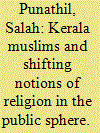

|
|
|
|
|
| Publication |
2013.
|
| Summary/Abstract |
This article primarily assesses the articulations of Mappila Muslim identity in the public sphere formed in colonial Malabar, especially after the Malabar Rebellion of 1921. The colonial history of the public sphere in Malabar serves as a backdrop to a better understanding of the construction of present-day Muslim identity in Kerala in terms of power and domination. It is shown that a Muslim community that rebelled against the colonial state in northern Kerala earlier and came to be seen as aggressive, uncivilised and religiously fanatic, still faces strong resentment and distrust today, while the memory of subalternity remains present, too.
|
|
|
|
|
|
|
|
|
|
|
|
|
|
|
|
| 2 |
ID:
117929
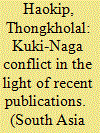

|
|
|
|
|
| Publication |
2013.
|
| Summary/Abstract |
This brief article critically reviews various recent essays and publications on the Kuki-Naga conflict of the 1990s. The conflict has resulted in uprooting hundreds of villages, with the loss of more than a thousand lives, destruction of valuable properties and internal displacement. While British colonial policies of governance in Northeast India and the rise of ethnic nationalism among Kukis and Nagas in the post-independence period have been identified as major root causes of the Kuki-Naga conflict, the literature remains inconclusive and this article argues that today competing claims and perceived threats regarding land and territory appear to be the major cause of continuing tensions.
|
|
|
|
|
|
|
|
|
|
|
|
|
|
|
|
| 3 |
ID:
117926
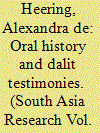

|
|
|
|
|
| Publication |
2013.
|
| Summary/Abstract |
The development of dalit literature and history plays a vital part in the effort of dalit communities to (re)gain recognition in Indian society. Victims of multiform discrimination in the name of caste, dalits have used these areas of self-knowledge to assert themselves culturally and socially. Indian society and mainstream intellectuals continue, however, to deny the value and legitimacy of dalit historical and literary productions. There is a tendency to believe that dalits should be kept out of the mainstream and effectively silenced. Therefore, testifying through writings or oral narratives still requires courage and determination. It certainly seems to be a demanding ordeal for those paving the way for dalit expression. This article, based on oral history fieldwork conducted among dalit (Cakkiliyar) communities in Tamil Nadu, as well as on written testimonies, highlights factors preventing dalits from exercising freedom of speech and also discusses some reasons why dalits do decide to speak.
|
|
|
|
|
|
|
|
|
|
|
|
|
|
|
|
| 4 |
ID:
117925
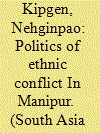

|
|
|
|
|
| Publication |
2013.
|
| Summary/Abstract |
This article analyses the conflict between the Kuki and Naga ethnic groups in the state of Manipur in North East India and attempts to understand why tensions arose in the first place and remain today between the two ethnic groups despite the formal cessation of hostilities in 1997. This ethnic conflict is shown to be a consequence of a lingering identity problem, aggravated by land disputes and equivocal responses of the state. It is argued that continued land disputes, the Nagas' unwillingness to perform Kuki customary rites and the government's indifference to the problem prevent these two groups from reaching a sustainable solution.
|
|
|
|
|
|
|
|
|
|
|
|
|
|
|
|
| 5 |
ID:
117927
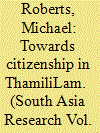

|
|
|
|
|
| Publication |
2013.
|
| Summary/Abstract |
In establishing the de facto state of Thamililam from 1990 onwards, the LTTE eliminated most of its Tamil rivals and mobilised the Tamil people for war in demanding ways. Despite its fascist character the Tiger state received the support of its subjects because it was understood to be a bulwark against Sinhala domination and the repository of sturdy Tamil nationalism, while the LTTE's propaganda cultivated a devotional aura around its mavirar (heroic dead).
This article highlights the strength of Tamil nationalism by interweaving this dimension within empirical details that outline Tamil political shifts and processes of migration from the 1970s to the 2000s. The centre of gravity in Tamil politics shifted first in the 1970s from a Colombo-Jaffna axis to a Jaffna-centric one and then from the Jaffna Peninsula to the Kilinochchi-Mullaitivu locality in 1995-96. The second spatial shift underpins the argument that the people under the LTTE were citizens of Thamililam. In technical terms they were dual citizens because they were also citizens of Sri Lanka. Where the latter claim was pressed-as it was, from different perspectives, by both the government of Sri Lanka and human rights advocates-one encountered a hegemonic imposition that denied the subjective feelings of those living within the de facto LTTE state. They were citizens of Thamililam. As such, they were enemies of Sri Lanka.
|
|
|
|
|
|
|
|
|
|
|
|
|
|
|
|